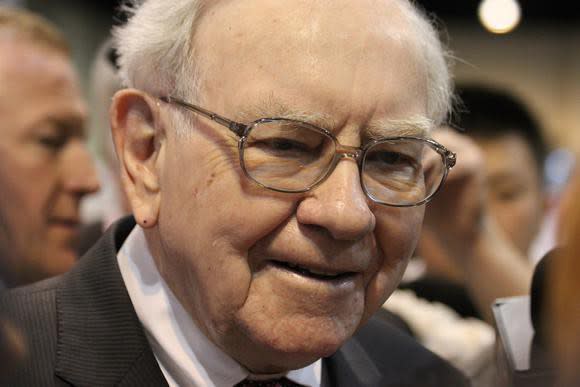Invest Alongside Warren Buffett in These Black Friday Stocks
If you're interested in buying top stocks that benefit from consumer spending over the holidays, you might want to follow in Warren Buffett's footsteps. Buffett is famous for picking stock market winners, and his investments in Costco Wholesale (NASDAQ: COST), Synchrony Financial (NYSE: SYF), and Visa (NYSE: V) put him in a position to profit handsomely from the holiday shopping season. Are these stocks smart buys for your portfolio?
Big bargains in bulk
Warren Buffett captured headlines when he significantly reduced Berkshire Hathaway's exposure to Wal-Mart (NYSE: WMT) this past year, but he seems to be a happy Costco Wholesale shareholder. He's a longtime owner (his business partner, Charlie Munger, sits on Costco Wholesale's board of directors) and as of September, Berkshire Hathaway owned 4.3 million shares of Costco worth roughly $750 million.

IMAGE SOURCE: MOTLEY FOOL.
Like Wal-Mart, Costco Wholesale pockets profit by buying in bulk and selling products at cut-rate prices. Unlike Wal-Mart, it also profits from the membership fees it charges people to become its customers.
Customers pay a $60 annual membership fee to gain access to Costco's buying power, and gold members fork over $120 per year so that they can get 2% back on their purchases. Those membership fees produced $2.8 billion in revenue last fiscal year alone. The company's 87% global renewal rate and 90% renewal rate in the U.S. and Canada shows that most customers are happy. The number of Costco cardholders has increased to 90.3 million from 81.3 million over the past two years.
Costco's decision to switch preferred credit card providers last year created a bit of uncertainty among investors, but sales trends suggest it's got plenty of growth momentum heading into the holidays this year.
Sales grew 16% to $41 billion last quarter. E-commerce sales jumped 21% year over year, yet they only account for 4% of global sales. The bulk of revenue continues to come from its warehouses, and sales are clocking in with healthy growth there, too. Other retailers are struggling with slowing sales and are being forced to close stores, but Costco Wholesale's same-store sales grew by a healthy 5.7% year over year last quarter, excluding volatile gasoline sales. For comparison. comparable store sales at Walmart inched up just 2.7% year over year last quarter. Furthermore, while Sears has closed over 330 stores this fiscal year, Costco Wholesale's store count has increased by 26 warehouses to 741.
Overall, the benefit of more members, growing e-commerce revenue, and new stores make Costco a solid stock to buy this holiday season.

IMAGE SOURCE: GETTY IMAGES.
Private-label credit cards
Warren Buffett only bought more shares in three companies last quarter, and Synchrony Financial was one of them. Berkshire Hathaway entered the quarter owning 17.5 million shares in the private-label credit card company, and it finished September owning 20.8 million shares.
Synchrony Financial turned up in Berkshire Hathaway's portfolio earlier this year after investors sold off shares because the bank had to write off more bad debt than expected. Rising charge-offs aren't good news for any bank, but Berkshire Hathaway's buying suggests Buffett thinks that concerns over creditworthiness are more than offset by the company's loan and net interest margin growth.
The number of active credit card accounts issued by Synchrony Financial has grown by 4% in the past year, and account growth, plus increased use by cardholders, resulted in a 9% year-over-year increase in loan receivables last quarter. The average yield on receivables clocked in at an impressive 21.78% in the third quarter, and because credit card interest rates increase more quickly than the funding costs of credit card loans, Synchrony Financial's net interest margin grew 40 basis points to 16.74%.
I don't see much on the horizon that's going to change those trends. Consumers are increasingly interested in reward programs, and deals offered by private-label retailers this holiday season should increase active accounts and loan receivables for Synchrony Financial next quarter. As a result, I think this credit card issuer will benefit from earnings growth this holiday season.
Profit from payments processing
Synchrony Financial isn't the only way investors can team up with Warren Buffett to bet on growing use of credit cards this holiday season. He also owns 10.5 million shares in Visa.
Unlike Synchrony Financial, Visa doesn't make its money by issuing credit card loans and collecting interest from borrowers. Instead, it makes its money by processing credit card and debit card transactions. In fact, it's the planet's biggest processor of credit card transactions, handling 29.2 billion transactions last quarter alone. As fellow Fool Matthew Frankel recently pointed out, there are more credit cards emblazoned with the Visa logo than there are cards with the Mastercard, American Express, or Discover logo in existence combined.
Last quarter, processing those billions of transactions propelled Visa's revenue and adjusted earnings per share (EPS) 14% and 15% higher from last year, respectively. The strong quarterly performance brought Visa's full fiscal year revenue to $18.4 billion and its adjusted EPS to $3.48, up 21% and 22% from last fiscal year, respectively.
Visa's decision to acquire Visa Europe was a big reason behind its growth. Sometimes, acquisitions don't go as planned, but that doesn't seem to be the case this time around. After only five quarters, Visa's sales and cost savings are both ahead of schedule.
In the future, Visa's growth may slow a bit from its recent clip, but it should still be able to produce enough growth to keep on rewarding investors with buybacks and dividend growth. It's Visa Direct person-to-person payment platform, mVisa, Visa Checkout, and Visa Token Services, as well as a partnership with PayPal and an investment in Square, should continue to keep it on the cutting edge of payments.
Next year, Visa thinks it can deliver high-single-digit revenue growth, and if so, then adjusted EPS should increase at a mid-teens rate. Since consumer card payments only surpassed cash payments for the first time in 2016, it would seem there's still plenty of opportunity for this company to pay off for investors.
Fool-worthy things to keep in mind
Increasingly, traditional retail companies are realizing that if they want to survive in an Internet economy, they need to get serious about providing value not only in their stores but online, too. Admittedly, Costco Wholesale has been late to make investments into e-commerce, but it appears to have become a bigger priority for the company recently. Given its growing membership base of loyal customers, I think there's an opportunity for Costco to enjoy double-digit e-commerce sales for the foreseeable future.
As for Synchrony Financial and Visa, they stand to benefit regardless of which retailer consumers choose to shop at this holiday season, Unemployment is near record lows and wages are beginning to edge higher -- and those two trends suggest that confident consumers will come out in force this shopping season. If so, then those two companies provide a great way to benefit without having to pick and choose which retailers will be winners or losers.
More From The Motley Fool
6 Years Later, 6 Charts That Show How Far Apple, Inc. Has Come Since Steve Jobs' Passing
Why You're Smart to Buy Shopify Inc. (US) -- Despite Citron's Report
Todd Campbell owns shares of Mastercard and PayPal Holdings. His clients may have positions in the companies mentioned. The Motley Fool owns shares of and recommends Mastercard, PayPal Holdings, and Visa. The Motley Fool owns shares of Square. The Motley Fool recommends American Express, Costco Wholesale, and Synchrony Financial. The Motley Fool has a disclosure policy.
